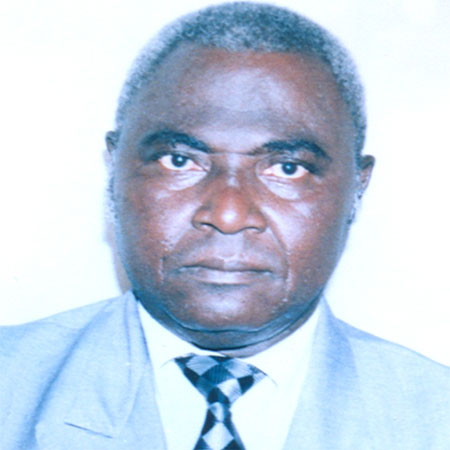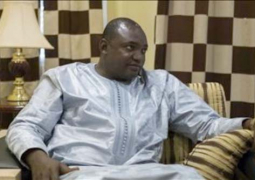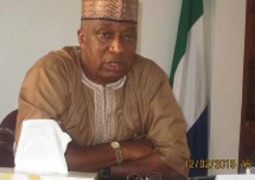
Lawyer Ousainou Darboe on 26th March 2010, in a marathon address, urged the Kanifing Magistrates' Court to declare Femi Peters not liable. This followed his success in getting judgment postponed in the case presided over by Principal Magistrate Kayode.
Delivering his address before a crowded courtroom, he told the court that in any criminal trial the burden of proof rests on the prosecution.
According to him, if the law does not cast the burden on the accused person, then the burden is shifted to the prosecution, citing the constitution.
It is rudimentary, he said, that the particulars of offence contains the element of the offence charged, and all the elements must be applied to the particulars as spelt out in the charge.
"In applying the elements and the particulars, all the elements should be proved," he further stated.
Lawyer Darboe submitted that it is fundamental in any application of any law which must be duely weighed in relation to the Constitution of The Gambia.
"What are the statements of offence, and the particulars?" he asked.
Defence counsel Darboe quoted section 110 of the Criminal Procedure Code Act which, according to him, provides that the particulars of offence must explain the offence charged so that the accused person would know what he is charged with, and then referred the court to the charge sheet in question.
According to the lawyer, a rally was held by a political party, and not by the accused person, and that this was confirmed by the first prosecution witness.
He submitted that it was recorded that the first prosecution witness said that it was not the accused who held the rally, but the UDP.
"Applying the evidence to the particulars of offence has not been proved," he submitted.
Further submitting, Darboe stated that the second prosecution witness (PW2) gave evidence of going to Ebony Junction and found someone speaking. "Who is this someone?" he asked.
Darboe challenged that it was contrary to the principle that the prosecution should link the accused to the commissioning of the offence, and argued that PW2 stated in his evidence that after the rally, they held a procession escorting a vehicle. "Who were the people escorting the vehicle?" he asked.
He indicated that PW2 did not say who was holding a rally.
According to lawyer Darboe, when the 3rd prosecution witness (PW3) was cross-examined, he told the court that he did not see the accused holding a loudspeaker, and did not see him talking to anybody.
He further submitted that the 4th prosecution witness (PW4) did not go to the meeting site; that his evidence did not relate to any incident and, therefore, his evidence was not relevant.
"The count on the evidence must fail," he stated. The defence counsel argued that the particulars of offence does not make the holding of a rally a criminal offence.
"What it makes criminal is the procession without a license," he told the court.
According to him, "if your statement of offence alleges and the particulars reveal something else, the charge cannot stand."
Darboe went on to say that any order under section 5 (1) should be gazetted, submitting that there was no allegation that the accused, having been ordered by a magistrate to stop a procession, went ahead.
"There is no evidence that there was an order that a rally should not be held," he added. "No witness stated that there was an order and it was disobeyed," he argued.
He submitted further that even assuming that it was alleged that there was a procession, there was no evidence before the court to show that there was procession by the accused. He stated that the prosecution was a little bit hasty to put somebody by Mr. Peters' profile and caliber in an opposition party.
At this juncture, lawyer Darboe dwelt at length on the interpretation of the constitution.
Submitting further, Darboe stated that on reading of any statute and it becomes clear to the court that the statute is inconsistent with the constitution, then that statute shall be void.
"If a law is not consistent, it cannot be applied," he argued, stating that all courts have the duty and responsibility to apply the law and the constitution.
He submitted that Section 25 of the constitution provides that every person shall have the right to freedom of assembly and to demonstrate without harm.
"Is the exercise of right and permission compatible?" he asked. He finally urged the court to discharge and acquit the accused since the prosecution had failed to prove the case beyond reasonable doubt.
In response, the prosecuting officer, Inspector Fadera, told the court that the accused stands trial on two counts.
According to Fadera, the prosecution has a burden of proof beyond reasonable doubt, but it does not mean that the prosecution should prove all the elements of the offence charged. He cited "The Law of Evidence" by Hassan Jallow in support of his argument.
He submitted that the prosecution, in proving its case, called four witnesses. He stated that PW1 in his evidence said that there was a rally at Ebony Junction, and he found the accused at the rally and asked whether he had obtained a permit, but it was fruitless.
Fadera also added that PW2, in his evidence said that there was a procession escorting a car, submitting that PW1, PW2 and PW3 all stated that there was a loudspeaker used at the rally. He stated that the accused was part of the rally where a loudspeaker was used.
He argued that the accused was the very person, through the name of UDP, who applied to hold a rally and used a loudspeaker.
According to him, the evidence of PW2 and PW3 corroborated and further argued that procession and rally are the same. The accused, he added, holds a significant position in the UDP, and since the accused was found in the gathering, he was part of the rally.
He challenged that if there is no law to apply to hold a rally, why did the accused apply for a permit, stating that the Public Order Act is still in force.
Submitting further, Inspector Fadera said that the accused was informed that the application to hold a rally was not approved, and he went ahead and held the rally. He stated that holding a rally without a permit is a violation of the law.
He finally urged the court to find that the accused has committed the offences and should convict him.
The case was adjourned to 1st April 2010 for judgment.




